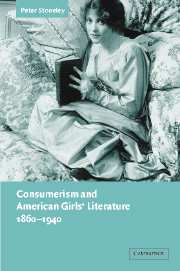8 - “Black Tuesday”
Published online by Cambridge University Press: 22 September 2009
Summary
Wall Street crashed on 29 October 1929, and thereafter it seemed as if there was not much left to “buy into.” By 1931 there would be between four and five million people without work; by 1932 the unemployment rate would have risen to 50 percent in some cities, and there would be over two million vagrants across the country; by 1933 five thousand banks would have collapsed, the unemployment rate would be 25 percent, and the national income would be half what it had been in 1930. Despite Federal works projects, the Depression would continue throughout the thirties. But, to put things facetiously, two girls would succeed where the Work Progress Administration failed. Nancy Drew and Laura Ingalls beat the Depression. Both first appeared in the early 1930s, and would flourish throughout the next ten years, and indeed, to the present day. Although the Nancy Drew series and the Little House series are very different, each seeks to rescue consumerist possibilities for the girl in an age in which they are endangered. They are revisions in that they take a step back in order to move forwards. Nancy is a quietened down, suburbanized outgrowth of the earlier syndicate series, while the Little House books take the heroine away from the metropolis once more, and back to the farm.
Entering into the world of the early Nancy Drew, it is as if the Depression is not happening.
- Type
- Chapter
- Information
- Consumerism and American Girls' Literature, 1860–1940 , pp. 122 - 140Publisher: Cambridge University PressPrint publication year: 2003



